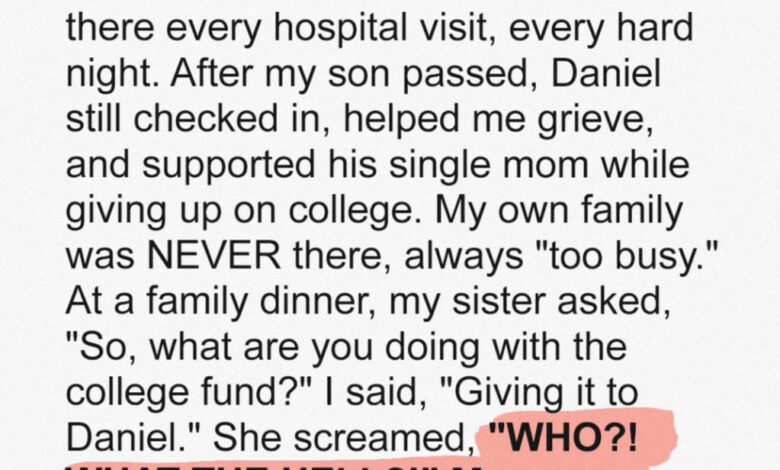My Family Demanded My Late Son’s College Fund—So I Gave Them One Condition

The day we buried my son, the house filled with flowers and promises. “Anything you need,” they all said. Then the weeks passed, and the promises thinned into silence. Everyone disappeared—except Daniel.
Daniel was sixteen, all elbows and sincerity, and he showed up at the hospital every weekend of the three years my boy fought to breathe. He brought sketches, bad jokes, and a stubborn patience that soothed the machines’ relentless beeping. When my own family couldn’t bear the antiseptic air, Daniel pulled up a chair and stayed.
One night, when the ward had settled into its blue hush, my son whispered, “Dad, promise me something.”
“Anything.”
“If I don’t make it, give my college money to Daniel.”
I squeezed his hand and lied like fathers do. “You’ll need it yourself.”
“Promise.”
“I promise.”
He died a few weeks later, “Here Comes the Sun” playing on a phone speaker, Daniel holding his other hand.
After the funeral, Daniel kept coming. Not out of duty—out of love. He brought a small wooden box he’d made for my son: a hospital bracelet, a photograph, a note that read, Thanks for being the best friend ever. On Tuesdays, we told stories and drank coffee that went cold between us. He worked part-time at the hardware store and quietly shelved his own college plans to help his mom with rent.
My family finally resurfaced over roast chicken at my sister Rebecca’s house. Midway through Uncle Will’s complaints about taxes, Rebecca dabbed her mouth and asked, “So, Scott—what are you doing with Ben’s college fund?”
Forks paused midair. My mother looked hopeful. My father straightened like a judge.
“I’m giving it to Daniel,” I said.
“WHO?” Rebecca snapped.
“Ben’s best friend,” I said. “The kid who never missed a weekend.”
“That money should stay in the family,” my mother said.
“It’s twenty-five thousand dollars,” Uncle Will added. “Be sensible.”
I set down my glass. “Blood vanished when things got hard. Daniel didn’t.”
“That’s not fair,” my father muttered. “We had our own—”
“What was playing,” I asked, “when your grandson took his last breath?”
Silence emptied the room. Faces blinked. Napkins stilled.
“Tell me about his last day,” I said. “What the doctor said. Which shirt he wanted for the funeral. His favorite.”
Blank stares.
“Right. You weren’t there. Daniel was. He knew the song. He knew the shirt. He knew my son.”
“That doesn’t entitle him to a dime,” my father said.
“You’re right,” I said. “It doesn’t entitle him. It recommends him.”
Rebecca’s voice splintered. “We’re family. That boy is nothing to us.”
I stood. “He was everything to Ben.”
I picked up my coat and turned back at the door. “You want the fund? Fine. One condition: look me in the eye and tell me about Ben’s last day.”
No one spoke.
Three weeks later, I carried a box into a small dorm room with cinderblock walls and possibility. Daniel taped his sketches above a desk piled with engineering texts. “I don’t know how to thank you,” he said.
“You already did,” I told him. “Every Tuesday.”
His roommate wandered in, grinned at me, and said, “Your dad seems cool.”
Daniel glanced my way, eyes bright. “Yeah,” he said softly. “He is.”
On the drive home, my phone buzzed. Rebecca: You’ll regret this, you selfish weasel. I deleted the message and rolled down the window. The air smelled like cut grass and rain.
Here’s what grief taught me: family isn’t who claims the money when the music stops. Family is who keeps time with you in the dark. My son knew that. Daniel lived it. And I—finally—honored it.
Sometimes the bravest thing you can do is keep a promise the world thinks is foolish. Sometimes the kindest thing you can do is choose your family.




